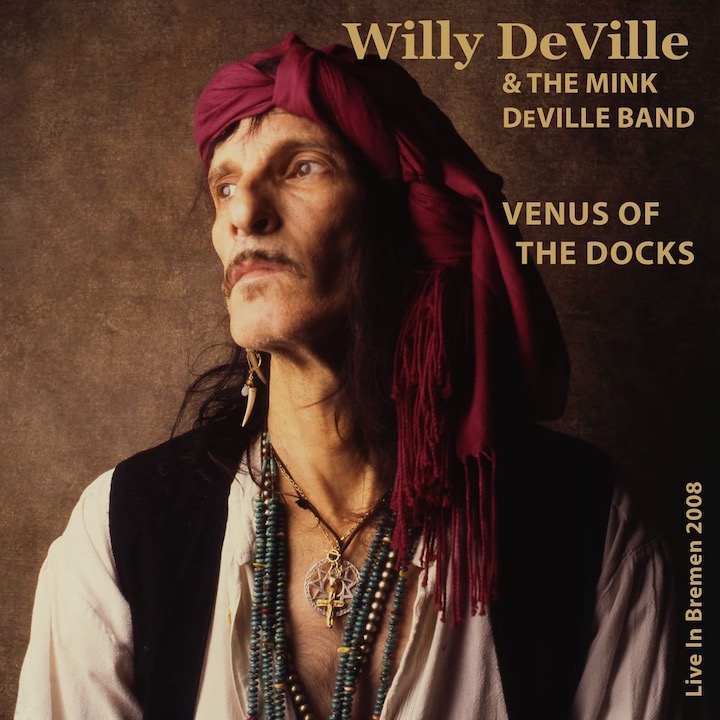A Superlative Live Set from Willy DeVille
Willy DeVille was part Native American, part Irish, and part Basque, and his consistently compelling music – which embraces genres ranging from punk and Cajun to doo-wop and Latin – is as diverse and unusual as his background. The studio albums that he recorded under his own name and with his band, Mink DeVille, virtually all merit exploration. But don’t miss his frequently electrifying live recordings, most of which resulted from his many European tours, including In Berlin, Live in Montreux 1994, Unplugged in Berlin, and the newly released Venus of the Docks: Live in Bremen 2008, which preserves a German concert from February of that year.
DeVille, who spent long stretches battling drug and drinking problems, received a diagnosis of hepatitis C in early 2009 and was found to have pancreatic cancer shortly thereafter. He died that August. But 18 months earlier, when he performed the show featured on Venus of the Docks, he was reportedly drug-free, sober, and feeling fine. He certainly sounds fired up throughout this 75-minute, 18-track concert, during which he plays guitar and harmonica and is accompanied by the more than capable Mink DeVille Band, which includes a keyboardist, a guitarist, an electric bassist, a drummer, backing vocalists, and a conga and washboard player.
The show predominantly features versions of self-penned standouts from DeVille’s studio catalog. Among them: a rollicking, party-ready “Venus of Avenue D”; “Spanish Stroll,” which sounds redolent of both Lou Reed and fifties rock; “Heart and Soul,” where DeVille channels Ben E. King and the Drifters with his sandpapery vocal work; and “Savoir Faire,” an edgy garage rocker. Also here are covers of well-known numbers like Elvis Presley’s “Heartbreak Hotel”; Moon Martin’s “Cadillac Walk”; “Hey! Joe,” which is one of many performances on Venus of the Docks to feature wild guitar work; and “Let It Be Me” where DeVille, backed only by piano, demonstrates what an evocative singer he could be.
The liner notes quote him as saying, “I know that I’ll sell much more records when I’m dead.” He was probably right, but better late than never. DeVille soaked up a lot of influences, but the music he produced wasn’t quite like anybody else’s and deserves to be widely heard.
Also Noteworthy

Erika Lewis, A Walk Around the Sun. When last heard from, singer/songwriter Erika Lewis was performing with Tuba Skinny, the New Orleans street band that collaborated with Maria Muldaur on last year’s terrific Let’s Get Happy Together. That album features blues, jug band music, and Dixieland jazz, but this solo outing stakes out different territory. Singing about romantic loves and friendships lost and found, Lewis delivers country-tinged indie-folk on numbers like “If You Were Mine” and “Running Wild.” But you can also hear a rock sensibility in her vocals and melodies on such tracks as “Loser,” whose opening drum part echoes the beginning of the Ronettes’ “Be My Baby.”

Michelle Malone, 1977. Michelle Malone, who usually rocks pretty hard, turns down the volume for an introspective album that emphasizes acoustic instruments and sounds a bit reminiscent of 1970s music from artists like Fleetwood Mac and Linda Ronstadt. Malone named the record for the year she started playing guitar, which she says was also “the year I started becoming me, so music from that era has always felt special.”
Lilting, mid-tempo material dominates the album, which features lyrics that while sometimes abstruse, avoid cliches and seem largely autobiographical. “The River Song,” for example, is about singing and writing songs with friends (and features vocal backup by Indigo Girls’ Amy Ray). “Georgia Made,” meanwhile, finds the Atlanta-based singer proclaiming that her family has been in the state for 300 years and that she could never move to Nashville because “Georgia clay must run in my bloodstream.”

Stew Cutler, The Blues from Another Angle. A more accurate title for this seventh studio album from blues guitarist Stew Cutler would be The Blues from Multiple Angles. Because Cutler has absorbed diverse influences during his four-decade career and works with a versatile group of musicians, this 11-track set embraces elements of jazz, R&B, blues, and more. The album opens with a fine cover of “Baby Can I Change My Mind,” the 1969 Tyrone Davis hit, which features a soulful vocal by Bobby Harden and a great piano interlude by Tom Wilson. Other high points include “Night Shift,” a New York City live recording; “Say What You Mean,” with James Montgomery guesting on harmonica; and Cutler’s jazzy, high-spirited instrumental album closer, “Shine or Rain.”
Jeff Burger’s website, byjeffburger.com, contains five decades’ worth of music reviews, interviews, and commentary. His books include Dylan on Dylan: Interviews and Encounters, Lennon on Lennon: Conversations with John Lennon, Leonard Cohen on Leonard Cohen: Interviews and Encounters, and Springsteen on Springsteen: Interviews, Speeches, and Encounters.



